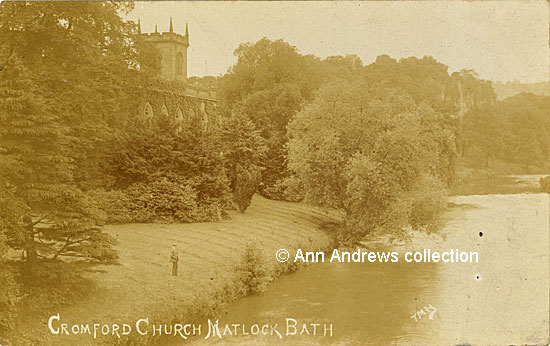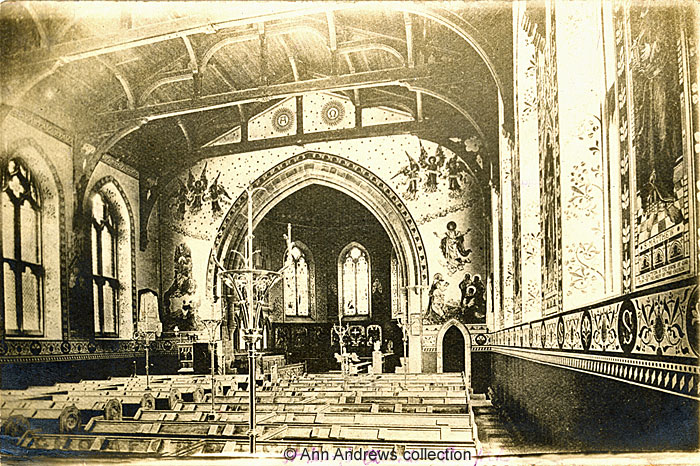St. Mary's Chapel in Cromford is on the opposite bank of the River Derwent from Willersley Castle. The river acts as the
parish boundary. The church was commissioned by Sir Richard Arkwright as a private place of worship for the family and the
building work completed by his son. It is the burial place of several members of Arkwright family, including Frederic George Alleyne
Arkwright who died during World War One[1]. Sir Richard Arkwright, builder of the
cotton mills in both Cromford and Matlock Bath, was buried first at Matlock but was later re-interred here.
 J. P. Malcolm described the Matlock funeral in an article for The Gentleman's Magazine in 1793. J. P. Malcolm described the Matlock funeral in an article for The Gentleman's Magazine in 1793.
There is a transcript elsewhere on this site (pp.44-46).
The Derbyshire Churches historian Charles Cox wrote about Cromford Church in 1877:-
"The endowment deed of the new chapel at Cromford, by Richard Arkwright, under date 20th September,
1797, sets forth that owing to the extensive manufactures, the village of Cromford had become very populous, that it
was distant two miles from the parish church of Wirksworth, that Sir Richard Arkwright (father of this Richard Arkwright)
shortly before his death erected a chapel on a parcel of land called the Smelting Mill, containing in length, within
the walls, from east to west, seventy-two feet, and in breadth forty-one feet two inches within the walls; that he had intended
to have it endowed and consecrated, but that he died before its completion, leaving instructions for its endowment, etc.,
etc. The charges paid by Richard Arkwright for consecrating the chapel amounted to £65 3s. 6d.†
The new chapel is dedicated to St. Mary, and it is said that it herein followed the dedication of its predecessor,
but of that we have no satisfactory proof.
The chapel, or church as it may now be termed, when originally erected by Mr. Arkwright, partook of the plain characteristics
of that time, and was destitute of a chancel, It was lighted by a double tier of five windows, circular-headed, and having
cast-iron frames. In 1858-9, it was greatly improved and "gothicised," by cutting down the two rows of windows into one,
and dividing them with stone mullions and tracery. At the same time a new chancel was added, the west portico built, and the galleries
and flat ceiling of the interior removed. The extent of these alterations, although the ground plan and walls of the 1797 chapel still
remain, may be gathered from the fact that they cost the late Peter Arkwright, Esq", the sum of £3,000.
The small tower over the west portico contains a single bell, which is inscribed :-
" Edward Arnold fecit. Leicester, 1796. "
† Add. MSS., 6,666, ff, 355, 357."[2]
 |
Tom Henshall must have taken the picture for this photographic postcard
of St. Mary's from the County bridge. |
Richard Arkwright endowed St. Mary's with £50 in 1797. The sum was later augmented by a further £200 from Mr. Arkwright, £200
from Queen Anne's bounty, a Parliamentary grant of £800 and another £200 in 1826[3].
A subscription list was opened in 1888 as a way of raising funds to light St. Mary's with gas[4].
The church closed at the end of 1896 for further improvements, replacing the old chancel arch with one considerably wider and
the flooring with "vetrious mosaic". New carved oak choir stalls were installed, the vestries improved and two new windows
were added. The roof and seating were also renovated and the pulpit, which was said to have been ugly, was enhanced. The stained glass
and the magnificent wall painting was done by Mr. A. O. Hemming, a well known ecclesiastical artist of the day. The renovation had been carried out
under the direction of Derby architects Messrs. Naylor and Sale. It was re-opened in April 1898, when the Bishop of Southwell dedicated
the numerous gifts to the church. The acoustics were said to be considerably better as a result of the work[5].

This early twentieth century postcard of the interior shows many of the changes undertaken during the 1896-98 restoration.
The painted figure closest to the camera on the right of the nave (south side) is St. Matthew, one of four evangelists[6].
Electric lights were to replace the gas holders in the 1920s.
Following the discovery of dry rot, Cromford Church Restoration Committee and the Arkwright Society, supported by English Heritage and members
of the Arkwright family, worked tirelessly for many years to ensure that all the structural problems were resolved and Hemming's magnificent
work in the nave and chancel was very carefully restored to its former glory. The work was completed at the beginning of this century[7].
St. Mary's is now Grade I listed.
|
References:
[1] Frederic George Alleyne Arkwright was also commemorated on both Matlock War
Memorial, Surnames - A-J and on Starkholmes War Memorial.
[2] Cox, J Charles (1877) "Notes on the Churches of Derbyshire Vol II" Chesterfield:
Palmer and Edmunds, London: Bemrose and Sons, 10 Paternoster Buildings; and Derby.
[3] Glover, Stephen (1833) "The History and Gazetteer of the County of Derby ..." Edited
by T. Noble. pub. Derby and London.
[4] "Derbyshire Times", 21 April 1888.
[5] "Ibid.", 16 April 1898.
[6] St. Mark, St. Luke and St. John are also on this side of the church whereas the prophets Isaiah, Jeremiah,
Ezekiel and Daniel are on the north side.
[7] Local newspapers recorded the Arkwright Society and the Restoration Fund jointly organising car boot sales, chartering a
"chuffer" for an outing to London, being given a part share of profits from a steam rally, holding celebrity lectures and an all day sit in to
pay for both the repair of the dry rot they had found and then the restoration of the wall paintings.
~~~~~~~~~~~~~~~~~~
There is more information in the Matlock section of the website.
 Pedigree of the Arkwright family Pedigree of the Arkwright family
 Details of the Arkwright Coat of Arms Details of the Arkwright Coat of Arms
 Descendants are named in various Matlock directories and census returns
elsewhere onsite Descendants are named in various Matlock directories and census returns
elsewhere onsite
 Matlock & Matlock Bath-inspiration-of-poets has a tribute to Peter Arkwright
by R. T., written after Arkwright's death in 1866. Matlock & Matlock Bath-inspiration-of-poets has a tribute to Peter Arkwright
by R. T., written after Arkwright's death in 1866.

Willersley Castle engraving (Cromford Hall), before 1791

Extract from "The Beauties of England and Wales" (1802), written shortly after Sir Richard's death, which describes
cotton manufacturing and has more on the
mills, Willersley Castle (plus an engraving), Sir
Richard Arkwright and the area surrounding Willersley.

Willersley Castle, 1802 engraving.

Willersley Castle, the first of several pages about the castle.
|